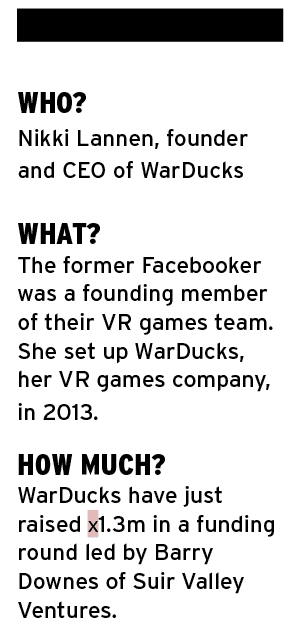Nikki Lannen, CEO and founder of VR gaming company WarDucks, is one of the Business & Finance Tech 100 2017. She talks about being at the forefront of the VR space.

Virtual reality (VR) is very much becoming a real-life reality in the tech space at the moment. With growing interest in the medium and the likes of Facebook acquiring Oculus VR in March 2014 for $2.3 billion, the dynamic and potential possibilities around VR are being looked into by businesses in great detail.
Nikki Lannen is one of the leaders in the VR space in Ireland. After spending five years on the Facebook games team she set up WarDucks, an interactive games company with VR titles such as Sneaky Bears and Sneaky Bears Rollercoaster launched for Samsung Gear VR. The games ranked second and 24th in the top-grossing charts on that platform.
STARTING OUT
“I came across another game-development start-up in Dublin who were winding things down so I joined forces with their developers. They were called Glass Robot Studios,” Lannen explains.
“We started WarDucks and we built a Facebook and mobile game called Global Agents. That game has over half a million downloads.”
The early success of her company and the rise of VR interest led to Lannen and her team delving further into the sector. “And then we decided to pivot into virtual reality because we realised there was a massive opportunity within the virtual reality space,” she says.
“It’s obviously a massively growing sector and we started to build content for mobile initially, so we launched a game called Sneaky Bears and we then had a game that went to number 24 in the top-sellers.
“We launched a second title, which was called Sneaky Bears Rollercoaster. That game went to number two in the best-selling charts. Minecraft was number one and we were actually number two.”
It was an extraordinary achievement: in a short period of time a VR game from a newcomer Dublin company was only kept off the top spot by one of the most popular games ever developed.
PLATFORM EXPANSION
WarDucks and the current market seem to be aimed at mobile, but screen size and resolution can be quite limiting in terms of expansion. The company is attempting to manufacture bigger and more challenging products across different platforms. “People really liked [the games] so we decided to develop a much bigger product for PlayStation VR, Oculus Rift and HTC Vive.
We decided to pivot into virtual reality because we realised there was a massive opportunity
“Mobile viewer is obviously quite restrictive in terms of graphics so desktop viewer is a much higher-quality, bigger project when you create content for those devices. PlayStation VR would be the biggest in terms of ownership.”
Though a thriving market, the concept is still quite niche especially for the casual punter.
“Initially it was just Oculus and HTC Vive and those kits are around €2,000 including the computer that drives it. You have to have a very, very high-spec games computer to drive them. And then PlayStation launched its VR kit – it’s a lower price point but it’s still quite expensive at €400. So we’re seeing a lot more scale now in terms of these early adopters purchasing the devices.
Next year we’re going to see a lot of development with stand-alone VR kits. They won’t be attached to a PC
VR, then, is expensive for the general public at this point in time. “I definitely agree. Next year we’re going to see a lot of development with stand-alone VR kits. They won’t be attached to a PC; they won’t have a mobile phone,” she says.
“They will come out at around the €400 price point so that’s going to have a big impact in the market. We’ll also see the others come down and become more compatible with regular PCs.”
VR IN EVERYDAY LIFE
Gaming isn’t the only pie WarDucks has its finger in. The company has recently pushed into wellness and mental health with an app to try and alleviate and reduce stress in work. These are important topics in the 21st-century workplace. “We actually built a meditation app,” says Lannen. “A lot of companies want to give wellness to their employees.
“We have looked at that area. Meditation is massive, and especially with virtual reality… It can have very positive benefits in terms of work productivity.”
With tech and gadgets becoming part of our everyday lives more and more, Lannen sees VR achieving comparable importance to our everyday mobile device: “I think VR will become a household item; I think you’ll see a VR kit in every house. I think it will be for multiple uses.
“There are other things like retail, buying a house… You can see loads of different applications with it on one VR kit.
“It’s kind of similar to the mobile phone. It’s just going to be the hardware that has multiple functions.”
POISED FOR SUCCESS
Feedback on WarDucks projects so far has been very promising, with launches and global setups imminent in the near future. “We’ve had very, very positive feedback; we’re very excited about that. We launched in Europe and in America; we’re going to launch in Japan and in Asia in the coming months as well.
“We just want to make sure that we’re well placed for success,” she says. This will be a lot more comfortable after news recently circulated that WarDucks is the recipient of a €1.3 million injection led by Suir Valley Investment, an entrepreneur-led venture capital fund. Extra funding was generated from Enterprise Ireland and private investors. The VR market is expected to grow from £1.4 billion in 2016 to £26.4 billion in 2022 and with this lucrative investment WarDucks aims to be at the forefront as the sector grows.
As far as Lannen is concerned there are no other direct competitors to WarDucks in the Irish market at the moment, and as the host of the monthly Irish VR Meetup she has her finger on the pulse of what is happening on the scene here. “We’re very much focused on making it more of a community anyway. I don’t know of any VR company doing what we’re doing: it is still quite niche,” she says.
With the virtual reality space heating up, and the market set to grow by billions over the next few years, WarDucks’ future – and that of its founder – looks bright.






